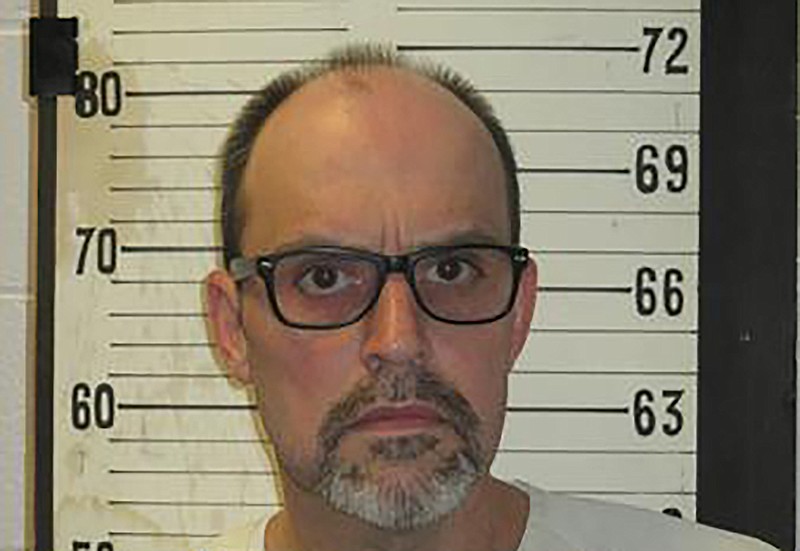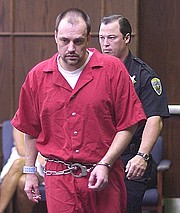In an hours-long hearing, Hamilton County Criminal Court Judge Don Poole heard testimony directly from the juror at the center of a death row inmate's last-minute legal battle to stop his December execution.
Lee Hall, who has changed his name from Leroy Hall Jr., was convicted in the April 1991 burning death of his ex-girlfriend, Traci Crozier. The 53-year-old is set to be executed on Dec. 5 and has requested to die by electrocution. Tennessee's primary method of execution is lethal injection.
Last month, Hall's defense filed three different petitions that essentially would accomplish the same thing - stop or delay the execution - if they weren't dismissed. The motions ask for a new trial based on claims of constitutional violations after a juror - identified only as "Juror A" - recently disclosed she'd had a history with domestic violence, including rape, prior to Hall's trial.
Hamilton County District Attorney Neal Pinkston has vehemently opposed the petitions, noting that the arguments are untimely and don't meet the standards set by state laws or precedents set by previous court rulings, and Poole dismissed two of the petitions earlier this week for those reasons.
"But there is law to the effect that in certain circumstances of due process fairness will allow certain things to be presented to the court, and for that reason, I have allowed this second petition for post-conviction relief to go forward," Poole noted at the beginning of Thursday's hearing. But "understanding that, statutorily, there is no basis for the second petition for post-conviction relief to be filed."
During the hearing, Poole and Pinkston heard directly from the juror, whose name has been sealed by the court, as she testified to her experiences with domestic abuse by her first husband, to whom she was married from 1969 to 1975, and her state of mind during the 1992 trial.
She said she didn't think of herself as a victim at the time because of societal views on date rape and marital rape.
"In 1969, there was really no such thing that I knew of, of date rape, especially since I'd been dating him for so long," she said. "I didn't even know the term 'domestic abuse' at the time. I really thought it was - I mean, I never thought of it as a crime. I had no notion that I had ever been a victim of a crime."
The juror denied admitting to being biased against Hall, though she did admit to saying she hated him.
But "that was during his testimony when he was talking about stalking her," she said. "I remember thinking, 'Oh, that's what my first husband threatened to do.'
"It was a fleeting thought."
Hall tried to appeal his conviction in 1998, a process that continued into 2003. During that time, his state-appointed defense team tried to track down jurors for interviews. But they couldn't reach Juror A because she lived out of state, and the Post-Conviction Defender's Office had limited resources. So an out-of-state flight would likely not have been approved if there was no reason to believe she was a "key juror," a former Post-Conviction Defender's Office investigator testified Thursday.
Regardless, Juror A testified that she probably wouldn't have told them about her past experiences at that time. She'd only recently come to terms with her victimization while undergoing grief counseling after the death of her second husband in 2007.
Pinkston pushed back on the idea that Juror A couldn't be reached. Why did no one call her or send her a letter, he asked.
Another defender's office investigator pointed out that it was the office's practice almost always to make in-person contacts rather than by phone or mail because jurors or witnesses are more likely to speak when approached face to face.
For example, if a juror is called and declines an interview, "they've already shut you down for that avenue," one investigator testified. "So I would try to avoid calling for that reason."
Investigators did locate the juror in 2014 when the Post-Conviction Defender's Office was again appointed to review Hall's case when the state asked to set an execution date. But she didn't remember if she was asked about domestic violence.
"Lee Hall is set for execution, 7 p.m., three weeks from today," Hall's attorney, Kelly Gleason, told Poole. "He has raised a serious constitutional error. It is a structural error, which we believe would have required granting him a new trial had it been raised earlier.
"It was only because juror A was not in a place to disclose this information when we did actively attempt to interview her in the 1998-2003 period and again in 2014."
Poole again noted that "if you go by the letter of the law, then I think all of [the petitions] are barred, quite frankly."
But he understood Hall's arguments.
"I think the petitioner basically argues due process, fairness," he said, while "the state argues, 'At some point in time, something has to end.'"
"That's where two major things come into conflict with each other," he said. "It's important that we all act quickly."
Poole is considering the matter and is expected to issue a ruling soon.
Bias in jury selection halted the scheduled execution of another Tennessee death row inmate this year.
In September, a judge approved an agreement that converted the death sentence of Abu-Ali Abdur'Rahman to life in prison due to concerns that racism tainted his jury selection pool, according to The Associated Press.
The agreement came after Abdur'Rahman, who is black, petitioned to reopen his case, presenting evidence that prosecutors at his trial treated black potential jurors differently from white potential jurors.
Tennessee's attorney general is appealing the agreement.
In this case, for both Hall and the victim's family, time is of the essence.
"I'm tired," Crozier's sister, Staci Wooten, said.
She'll never forgive Hall, she said. She's anxious. She thinks Hall should have been executed much earlier.
"This should have never happened to [Crozier]," Wooten said. "And I've hated that it's dragged out this long - 28 years."
Hall's death will bring the family some closure, but "it'll never bring her back," Crozier's father, Gene Crozier, said.
The Associated Press contributed to this story.
Contact Rosana Hughes at rhughes@timesfreepress.com or 423-757-6327 with tips or story ideas. Follow her on Twitter @HughesRosana.

